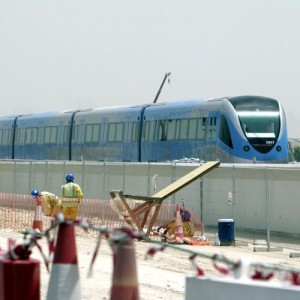 DUBAI // About a third of the jobs on the new Dubai Metro will go to Emiratis, according to a senior project director.
DUBAI // About a third of the jobs on the new Dubai Metro will go to Emiratis, according to a senior project director.
In total, 2,150 people will be needed to operate the the Red Line when it opens in September. Eight hundred positions have already been filled and a big recruitment drive is under way.
Serco, the operator of the system, wants 30 per cent of the jobs to go to nationals. Paul Anderson, project director, said: “We have a strong Emiratisation policy.”
Mr Anderson said Emiratis would fill managerial and supervisory roles and would be trained to the required skill levels.
Serco has set up a website, www.joindubaimetro.com solely for recruiting purposes and will attend this year’s Careers UAE job fair at the end of the month.
“There are already a lot of consultancy firms looking for people all over the world, chiefly India and the Philippines,” said Peyman Younes Parham, director of the Roads and Transport Authority’s marketing and corporate communications department.
The 30 per cent Emiratisation requirement is high compared with the targets set for companies in several other sectors. The insurance industry had a 15 per cent requirement in 2007-08, with an additional four per cent required each year. So far, however, Emiratis make up only seven per cent of the workforce.
The banking sector’s quota was set at four per cent in 1997-98, with the stipulation that it should increase by four per cent a year, giving the industry a requirement of 44 per cent of its staff to be Emirati this year.
Serco has hired specialists who have trained staff for the Hong Kong metro, and the newest recruits have begun their training.
“The majority are already in the classrooms. In two months’ time, they will receive hands-on training at the stations,” added Mr Parham.
There are five different training programmes, including a graduate engineer programme and apprentice schemes for school-leavers.
“In the operations management course we train for future leaders in the appropriate departments like operation supervisors and stationmasters,” said Mr Anderson.
Three of the eight directors at Serco were Emiratis, he added. “The remaining five are expatriates who are railway experts or specialists.”
Security supervisors had been recruited locally. “They come from the police or other areas of security,” he said.
On its website Serco has also posted 49 positions, ranging from a performance analyst to a cleaner, and including a track technician, a finance assistant, a graphic designer and a car park duty manager.
The Dubai Metro, which is intended to relieve the traffic burden on the city’s roads, requires job applicants to have good communication skills, including both spoken and written English.
It is mandatory for all applicants to meet standards for the role applied for and complete a medical. Visual and hearing tests will be conducted on the candidates, who will have to show they can make quick decisions, concentrate despite distractions and pay attention to detail.
The eagerly awaited Dh15.5 billion (US$4.2bn) driverless railway is on target for September 9, but questions have been raised over the opening of some of the stations because planned residential and commercial developments nearby will not be completed on time.
However, the project has met several deadlines, including the completion of the Red Line’s viaduct three days early.
The 52km viaduct, which stretches the length of Sheikh Zayed Road between Al Rashidiya and Jebel Ali, is expected to carry an estimated 27,000 passengers an hour in each direction on 42 trains, stopping at Burj Dubai, Internet City and Jebel Ali among other places.
www.eyeofdubai.com Sunday March 15 , 2009 10:44:33 AM
















